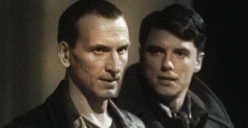Difference between revisions of "Operation Damocles"
From TheHolo.Net Forums Wiki
m (→Members) |
m |
||
| Line 10: | Line 10: | ||
| Members=See Below | | Members=See Below | ||
}} | }} | ||
| + | |||
| + | Despite the success of [[Operation Pelius]] during the Second World War, the British Government ultimately chose to dissolve [[Special Wing]] in 1947. | ||
| + | |||
| + | Years later during the Cold War however, the British Government expressed concerns that the Soviets might be training "superhumans with paranormal abilities" for use in covert operations against the West. Combined with a slight increase in mutant activity within Britain's own population, the Ministry of Defense elected to revive Special Wing in a new form, codenamed '''Operation Damocles'''. | ||
| + | |||
| + | Placed under the command of Colonel [[Wayland Godfrey]] - one of the few members of Operation Pelius to remain a serving member of the British military - the new agency was designated '''Section 13''' in military documentation, in reference to the office of Military Intelligence that had coordinated with Special Wing during the War. The organisation drew agents from the military, law enforcement, and the Security Service, focusing primarily on those with "skills and abilities of an operationally beneficial nature". RAF Pirtrevie Castle in Scotland - already the headquarters of NATO, Royal Air Force, and Royal Navy commands in the North Atlantic - became their base of operation. | ||
| + | |||
| + | Section 13 was involved in a number of counter-mutant activities during the Cold War; in particular it was instrumental in dismantling the terrorist cell of the mutant known as [[Hurucan]], though Hurucan himself evaded capture. | ||
| + | |||
| + | Once relations between the West and the Soviet Union became less hostile, Operation Damocles focused it's efforts on matters of national security. By the early nineties however, cuts in the military budget ultimately led to Section 13 being disbanded, with the Security Service assuming the responsibility of policing mutant activity on British soil. | ||
== Members == | == Members == | ||
| − | * [[ | + | * Colonel [[Wayland Godfrey]] - Commander |
| − | * | + | |
| − | * [[Walter Harriman]] - | + | * Commander [[Nathan Godfrey]] - Royal Navy, Intelligence |
| + | * [[Walter Harriman]] - Royal Air Force | ||
| + | * "John" - Royal Air Force | ||
Revision as of 15:32, 3 April 2012
Counter (Mutant) Terrorism
British Government
Despite the success of Operation Pelius during the Second World War, the British Government ultimately chose to dissolve Special Wing in 1947.
Years later during the Cold War however, the British Government expressed concerns that the Soviets might be training "superhumans with paranormal abilities" for use in covert operations against the West. Combined with a slight increase in mutant activity within Britain's own population, the Ministry of Defense elected to revive Special Wing in a new form, codenamed Operation Damocles.
Placed under the command of Colonel Wayland Godfrey - one of the few members of Operation Pelius to remain a serving member of the British military - the new agency was designated Section 13 in military documentation, in reference to the office of Military Intelligence that had coordinated with Special Wing during the War. The organisation drew agents from the military, law enforcement, and the Security Service, focusing primarily on those with "skills and abilities of an operationally beneficial nature". RAF Pirtrevie Castle in Scotland - already the headquarters of NATO, Royal Air Force, and Royal Navy commands in the North Atlantic - became their base of operation.
Section 13 was involved in a number of counter-mutant activities during the Cold War; in particular it was instrumental in dismantling the terrorist cell of the mutant known as Hurucan, though Hurucan himself evaded capture.
Once relations between the West and the Soviet Union became less hostile, Operation Damocles focused it's efforts on matters of national security. By the early nineties however, cuts in the military budget ultimately led to Section 13 being disbanded, with the Security Service assuming the responsibility of policing mutant activity on British soil.
Members
- Colonel Wayland Godfrey - Commander
- Commander Nathan Godfrey - Royal Navy, Intelligence
- Walter Harriman - Royal Air Force
- "John" - Royal Air Force


